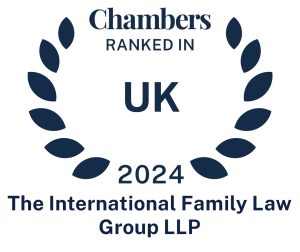In the majority of cases child maintenance is determined exclusively by the formula prescribed by the Child Maintenance Service (CMS). In summary it is a percentage of the paying parent’s income with deductions for overnight care. But there are some exceptions where the English family court may have the power to make orders in relation to child maintenance. These include:
- Where one of the parents or the child lives outside England and Wales
- Where the paying parent’s income exceeds £156,000 gross per annum
- Where the parents agree within divorce proceedings that the court may make orders in respect of child maintenance and
- Where the parties have an exact 50/50 shared care arrangement for the children
In these circumstances the court may have the power – albeit sometimes only in relation to income above a certain level (point two above) or for a fixed period of time (point three above) – to make orders in respect of child maintenance.
In GW and RW [2003] EWHC 611 (Fam), a divorce case where the wife and children had returned to live in Australia, Nicholas Mostyn QC (then sitting as a deputy High Court judge) held as follows (para 74):
‘I am of the view that the appropriate starting point for a child maintenance award should almost inevitably be the figure thrown up by the new child support rules. The Government’s express policy in making a awards of child maintenance susceptible to abrogation and replacement by a maintenance calculation by the CSA was that child maintenance orders should be negotiated “in the shadow of the CSA [now CMS]” (emphasis added).’
The judge went on to refer to the Government White Paper A New Contract for Welfare: Children\’s Rights and Parent\’s Responsibilities1 which stated that if a court based award was made ‘markedly at variance’ with a CSA/CMS calculation there would be a high temptation for one party to approach the CSA/CMS after the order had been in effect for 12 months for a calculation which could in turn lead to ‘obvious acrimony’ and may ‘cast doubt on the fairness of the original ancillary relief settlement between the parties’. The Government expressed a view that this should be ‘avoided at all costs’.
In Re TW & TM (Minors) [2015] EWHC 3054 (Fam), a case concerning child maintenance for two children of unmarried parents under Schedule 1 of the Children Act 1989, Mostyn J (by now a full time High Court judge) held as follows (para 9):
‘My decision in GW v RW makes it clear that where a court is considering issues of child maintenance the formula is not, so to speak, written in marble but supplies only a starting point. There may be in a case a very good reason why there should be departure from the starting point of the formula. In my opinion the formula should apply even where the earnings of the father are in excess of the £3,000 per week maximum provided for in the Act and the Regulations. If the earnings of the father were very much in excess of that then there would be a good reason to depart from the formula downwards, but if the income of the father is not un-adjacent to the maximum then to my mind, subject to other factors, that of itself is not a good reason to depart from the formula.’
In CB and KB [2019] EWFC 78, another judgment of Mostyn J, the court famously held as follows (para 49):
‘I suggest that in every case where the gross annual income of the non-resident parent does not exceed £650,000, the starting point should be the result of the formula ignoring the cap on annual gross income at £156,000. For gross incomes in excess of £650,000 I suggest that the result given by an income of £650,000 should be the starting point with full discretionary freedom to depart from it having regard to the scale of the excess.’ (emphasis added)
Until this month a practice had therefore developed of using the CMS formula as the starting (and often end) point for calculating child maintenance in cases where the court had jurisdiction to make a child maintenance order. However, two cases handed down this month (November 2022) have cast some doubt on that approach.
First, a decision of Moor J in CMX v EJX (French Marriage Contract) [2022] EWFC 136 which was handed down on 2 November 2022. In that case, involving a financial claim on divorce, the court held as follows (para 86):
‘I have to decide on periodical payments for C. I have jurisdiction as there has been a maximum CMS assessment of £15,288 per annum. Mr Boydell refers me to a decision of Mostyn J in CB v KB in which he suggested that the easiest way to calculate the top-up maintenance was to apply the same rate as the CMS to the Husband’s income, namely 9.8% between the CMS maximum of £156,000 and an income of £650,000. This would give a total award of £63,804 per annum in this case. I do, of course, accept that the beauty of the decision of Mostyn J is that it makes it easy to calculate the figure, so avoiding dispute. There are, however, significant disadvantages. There were four children in CB v KB so the Wife got £12,600 per annum per child. Given that I have to apply section 25, it is impossible to see why the Wife in CB v KB gets £12,600 per child but this Wife receives £63,804 for one child just because the two eldest children in this case are no longer part of the calculation. If they were, the figure would reduce to £21,268 each.’ (emphasis added)
This was followed by the decision of Mostyn J in Collardeau-Fuchs and Fuchs [2022] EWFC 135, which was handed down 12 days later on 14 November 2022, where the court made a distinction between claims for child maintenance between married and unmarried parents. Mostyn J noted that claims between married parents under the MCA 1973 require the court to specifically have regard to the standard of living enjoyed by the family before the breakdown of the marriage and to any physical or mental disability of either of the parties to the marriage, but took the view that although these factors are not explicitly mentioned in Sch 1, they would no doubt fall for consideration under all the circumstances of the case.
Mostyn J also observed that although where the court is considering a claim for child maintenance under the MCA 1973 it must have specific regard to the standard of living enjoyed by the family before the breakdown of the marriage, this factor should not be allowed to ‘dominate the picture’ as there will be many children who will not have experienced a standard of living within a functioning relationship either because the liaison between the parents was very brief, or because the child was born after the relationship had come to an end. He also said that there would be some cases – the present case being one of them – where the standard of living enjoyed by the whole family before the breakdown of the relationship would be of great importance.
Mostyn J also noted that unlike claims for child maintenance under the MCA 1973, the court under Sch 1 was not expressly required to give first consideration to the welfare of the child. This distinction was however promptly stated to be of no relevance for the reasons explained by Hale J (as she then was) in J v C [1999] 1 FLR 152 as follows (para 156):
‘The reason for the omission of the requirement to treat the child\’s welfare as the first consideration is probably that these provisions apply in cases where the adult parties are, or were, married to one another and, therefore, the court will usually be faced with claims for some provision for the adults as well as for the children. In such cases it makes sense to provide that the children\’s welfare should come before that of the adults in determining those claims. Nevertheless, in cases under the Children Act 1989 the welfare of the child concerned, even if neither the paramount nor the first consideration, must be one of the relevant circumstances to be taken into account when assessing whether and how to order provision.’
But Mostyn J then went on to draw a further distinction which might be of more relevance, namely that in a claim for child periodical payments under Sch 1 the child support claim will be ‘front and centre’ in the litigation. By contrast, a claim for child payments mounted under the MCA 1973 will often be subsidiary to the primary claim made by the parent as a spouse. Mostyn J went on to say – when referring to the ‘apply the CMS rates up to gross annual income of £650,000’ principle – as follows (para 120):
‘That pragmatic, and I believe useful, guideline is obviously intended to apply forcefully to those cases where the court is considering child support as a subsidiary claim within a wider financial remedy claim. It will be a rare case where the court in a financial remedy claim between divorcing spouses will spend much time and forensic energy analysing a child maintenance budget. In contrast, in a case under Schedule 1 the child maintenance budget is the principal litigation battleground.’ (emphasis added)
For completeness it is also worth noting that Mostyn J noted that there may be some cases where although the court may be hearing the claim under the MCA 1973 it might nevertheless determine it by reference to the child maintenance budget rather than applying the CMS formula. He said that the most obvious example would be an application to vary an existing child maintenance order but went on to give other examples including a situation where the claimant does not have a personal spousal claim to advance because:
- they have means of their own
- they have remarried
- for personal reasons they have chosen not to make a personal claim, or
- where (as happened in the present case) the terms of a marital agreement prevent them from making a personal claim
Mostyn J said that in these cases the child maintenance claim should be subjected to the same degree of scrutiny as a claim under Sch 1 but with the court looking specifically at the standard of living enjoyed by the family before the breakdown of the marriage.
In an international context, it is submitted that if the children and/or parents live outside England and Wales there might some further good reasons for a distinction. For example, where they are living in a country where the costs of living are significantly more expensive or cheaper than in England that may be a relevant factor. Similarly, if one or both parents is working in a jurisdiction where different rates of tax apply that may also be a good reason for adjusting the CMS rates (which operate on gross income predicted on English rates of income tax). If the paying parent has to pay costs to maintain a relationship with children located in another country that may also justify a different approach.
On the other hand, the most obvious disadvantage of moving away from following the CMS rates in Sch 1 cases is the lack of predictability and, in turn, likely resulting increase in litigation and expenditure on legal fees which the courts are (rightly) seeking to discourage at the moment. For international cases where the paying parents income is below £156,000 gross per annum it may also give rise to a sense of unfairness (unless there are good reasons such as different tax rates or costs of maintaining a relationship with a child) if the child maintenance is higher or lower than it would have been on a CMS basis had everyone been living in England. This will be felt particularly acutely by parents who find themselves living in a different country to their children against their wishes.
How district and circuit judges approach claims for child maintenance going forwards remains to be seen. At the moment Mostyn J seems to have drawn a distinction between claims for child maintenance which are resolved alongside other claims on divorce (in which case the CMS rates may still be appropriate) and claims where child maintenance falls to be determined in isolation (in which case the budget may assume greater importance). It is not immediately clear whether Moor J will also adopt that distinction, although given that the comments made in CMX v EJX (French Marriage Contract) involved a case where child maintenance was determined alongside the wife’s income needs it might suggest that he favours a budget-driven approach in all cases.
In the meantime, Mostyn J has provided the following propositions (perhaps of greater relevance for cases which fall outside his apply the CMS rates approach) in Collardeau-Fuchs and Fuchs at paragraph 129:
When determining a child maintenance application, the welfare of the child must be a constant influence.
A child maintenance award can extend beyond the direct expenses of the children. It can additionally meet the expenses of the claiming parent’s household, to the extent that they cannot cover, or contribute to, those expenses from their own means. Such an award might be referred to as a Household Expenditure Child Support Award (‘a HECSA’). The essential principle is that it is permissible to support the child by supporting the claiming parent. But a HECSA cannot meet those expenses of the claiming parent which are directly personal to them and have no reference to their role as carer of the child. An example is a subscription to a nightclub. However, the award can meet the expenses of the claiming parent which are personal to them provided that they are connected to their role as a carer. Examples are the provision of a car or designer clothing.
The reasonable level of the claiming parent’s household expenses should be judged by reference not only to the present standard of living of the respondent but also, if applicable, to the standard of living enjoyed by the family prior to the breakdown of the relationship. The object of a HECSA is not to replicate either such standard, but to ensure that the child’s circumstances ‘bears some sort of relationship’ to them. The standard of living in the parties’ home prior to the breakdown of the relationship is ‘as good a baseline’ as any other.
The HECSA must be set at such a level that the claiming parent is not burdened by unnecessary financial anxiety.
When assessing the claiming parent’s budget, the court should paint with a broad brush and not get bogged down in detailed analysis. Rather, the court should achieve a fair and realistic outcome by the application of broad common-sense to the overall circumstances of the particular case.
Michael Allum
[email protected]
The International Family Law Group LLP
www.iflg.uk.com
© December 2022
-
Michael Allumhttps://iflg.uk.com/team/michael-allum
-
Michael Allumhttps://iflg.uk.com/team/michael-allum
-
Michael Allumhttps://iflg.uk.com/team/michael-allum
-
Michael Allumhttps://iflg.uk.com/team/michael-allum









